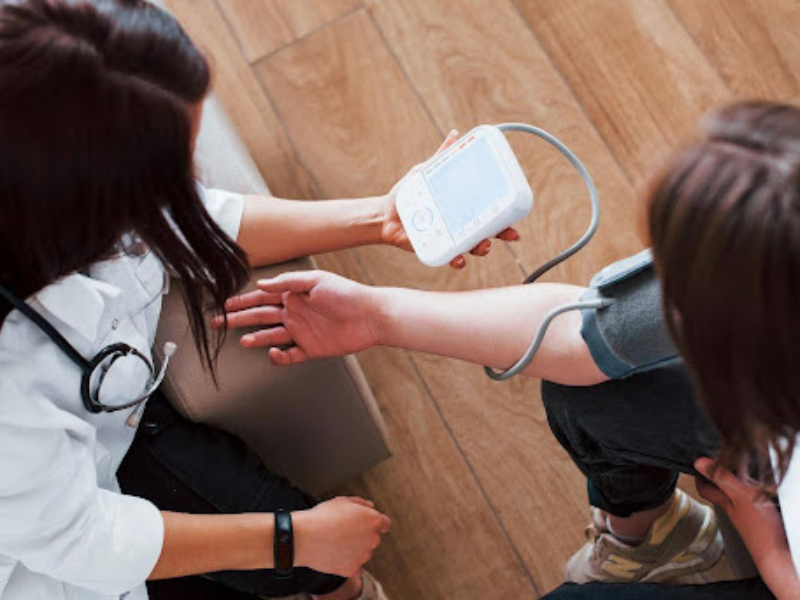
Menopause and High Blood Pressure: What You Need to Know
Menopause is a significant milestone in women’s lives, signaling the end of the menstrual cycle and a shift in hormone levels that can impact various aspects of health. Declining hormones during menopause exert surprising influences on blood pressure! Yes, many women find that as they are approaching menopause, their blood pressure begins to climb.
But why is this the case? Is menopause alone behind this? And more importantly, how can it be managed? Let’s unpack the mysteries and touch the edges of the science behind menopause and blood pressure. Whether approaching or navigating menopause, understanding these changes can help you take control of your health.
Impact of Hormonal Changes During Menopause in Blood Pressure Regulation
As menopause onset, hormone levels, especially estrogen levels, start to fluctuate and eventually decline. This hormonal shift can have widespread effects on the body, including how blood vessels function.
Estrogen helps maintain the elasticity of blood vessels, promotes healthy flow, and supports good cholesterol levels. When estrogen levels drop during menopause, blood vessels become stiffer, blood flow gets deregulated and thus, contributing to higher blood pressure.
Progesterone on the other hand, which has a relaxing effect on the blood vessel wall, also decreases, adding to the likelihood of hypertension.
Hormonal change sheds light on other factors during menopause that negatively affect blood pressure regulation. Such factors are:
- Weight Gain: Women experiencing weight gain during menopause, partly due to hormonal changes, suffer from high blood pressure because the excess weight puts extra strain on the heart and blood vessels.
- Changes in Body Composition: Hormonal shifts lead to changes in body fat distribution and increase visceral fat, contributing to increased blood pressure and eventually cardiovascular disorders.
- Increased Sensitivity to Salts: As estrogen wanes during menopause, its proactive role in blood vessel flexibility is compromised. Subsequently, the blood vessels become stiffer, and the body’s natural ability to handle sodium is affected. This makes blood pressure more likely to increase with even a moderate salt intake. Additionally, with insufficient estrogen levels, the kidneys retain more sodium than before, which increases blood volume and, thereby, increases blood pressure.
- Increased Stress: Due to significant life stressors during menopause, be it career challenges or family dynamics, the release of cortisol and other stress hormones is triggered, leading to long-term hypertension or blood pressure increase.
- Reduced Physical Activity: Physically less active, poor diet and lifestyle habits such as smoking and alcohol consumption end up in an increase in blood pressure.
Understanding the Science: Is Menopause Directly Linked to High Blood Pressure?
While hormonal changes contribute to elevated blood pressure, menopause itself is not the sole cause, and aging plays a critical role, too. Blood vessels naturally lose some elasticity over time, and plaque buildup can increase with age, raising the likelihood of cardiovascular disorders.
Menopause is often accompanied by lifestyle changes or conditions that also influence blood pressure, such as weight gain, reduced physical activity, and increased stress.
Women’s Health Initiative (WHI) reported that postmenopausal women are more likely to develop high blood pressure than premenopausal women, suggesting a link between menopause and increased risk.
However, studies also show that lifestyle factors often become perilous at midlife, so menopause might intensify but not entirely cause high blood pressure.
Why is Managing Blood Pressure During Menopause So Crucial?
High blood pressure is often called the “silent killer” because it typically does not produce symptoms. However, it can quietly damage the cardiovascular system, kidneys, eyes, and brain (all the vital organs). During menopause, managing blood pressure becomes especially important because it increases the risk of cardiovascular disorders.
The elevated blood pressure in menopausal women potentially leads to complications such as stroke, heart attack, kidney disease, and even cognitive impairment. By managing blood pressure during this time, you not only safeguard your heart but also improve your overall quality of life.
How to Manage High Blood Pressure during Menopause? Evidence-based Tips

Now focusing on the managing tips of high blood pressure during menopause. There are effective strategies for keeping the blood pressure in check:
- Adopt a Heart-healthy Diet: Adopting DASH (Dietary Approaches to Stop Hypertension) and a Mediterranean diet are effective for managing blood pressure. The former diet emphasizes reducing sodium intake and focuses on nutrient-rich food providing calcium, potassium, and magnesium for regulating blood pressure while the latter emphasizes consuming whole, minimally processed foods and healthy fats. These diets include fresh fruits and veggies, whole grains, lean proteins, and healthy fats like olive oil and nuts.
- Increase Physical Activity: Regular exercise is one of the most effective natural ways to reduce high blood pressure. Activities such as walking, swimming, and cycling improve heart health and promote weight control. According to research, 150 minutes of moderate exercise weekly can reduce blood pressure and provide a mood boost as well- something many women appreciate during menopause!
- Manage Stress Effectively: Menopause is indeed a stressful phase, and chronic stress is a known contributor to high blood pressure. Mindfulness practices such as yoga, meditation, and deep breathing can reduce stress levels and help keep blood pressure in check. Even simple daily habits, like a short walk outdoors or listening to relaxing music can make a difference.
- Limit Salt and Alcohol Intake: During menopause, even an average salt intake can raise blood pressure, especially in sodium-sensitive women. Consider using herbs and spices to flavor food instead. Limiting alcohol is also essential, as too much raises the blood pressure- moderation is the key!
- Get Sufficient Sleep: Quality sleep is crucial for blood pressure regulation. Poor sleep patterns increase stress hormones, which may elevate blood pressure. Sleep disturbances are common in menopause due to hormonal shifts, so consider practices that promote better sleep, such as a cool room, a consistent bedtime, and limiting screen time before bed.
Role of Medication and Supplements in Managing High Blood Pressure during Menopause
For some women, lifestyle changes alone may not be enough to control blood pressure. In these cases, medical practitioners prescribe medications like ACE inhibitors, diuretics, or calcium channel blockers depending on the patient’s body responsiveness.
The healthcare provider also prescribes the optimal dose for these medicines and therefore, should be taken strictly under the supervision of doctors!
Certain supplements like Omega-3 fatty acids, coenzyme Q10, and magnesium are being prescribed to improve blood vessel function.
Does HRT Disrupt Blood Pressure?
Hormone Replacement Therapy (HRT), a common treatment for menopausal symptoms has a complex relationship with blood pressure. Some studies suggest that estrogen-only HRT may have a protective effect on blood pressure, while others indicate that combined HRT might have varying effects.
HRT can be beneficial for some women but is not recommended universally. Always consult your healthcare provider to weigh the benefits and risks in the context of your personal health and family history.
Keep Track of Your Blood Pressure
Regular monitoring is vital for monitoring high blood pressure during menopause. Home blood pressure monitors make it easy to keep an eye on your numbers, allowing you to make adjustments as needed. Many healthcare providers recommend tracking blood pressure readings over time, noting any patterns or changes to discuss with your doctor.
Let’s Talk About Some Misconceptions About Menopause and High Blood Pressure: Myth Busting
Myth 1: Menopause Alone Causes High Blood Pressure
While menopause contributes to changes that may increase the likelihood of high blood pressure, it is inaccurate to say that it is the sole cause. Other factors such as genetics, diet, activity level, and stress are often just as influential, if not more so.
Myth 2: HRT will Raise Blood Pressure
Some believe that HRT can lead to high blood pressure, but it is not necessarily true. Although every individual responds differently, estrogen-only HRT is proven to have a neutral or even beneficial effect on blood pressure in some women. It is always a best practice to consult your healthcare provider to determine if HRT is a safe option for managing menopausal symptoms without increasing the risk of hypertension.
Myth 3: Hot Flushes Causes High Blood Pressure
Hot flushes can cause temporary spikes in heart rate and blood pressure due to the body’s intense response to heat. However, these spikes are usually short-lived and do not contribute to long-term high blood pressure.
Final Takeaway
Menopause is a period of transformation and change, but it does not have to mean sacrificing health or well-being. High blood pressure during menopause is not inevitable and it is something you can manage effectively with a holistic approach.
By embracing a healthy diet, staying active, managing stress, and making informed decisions about medication or HRT, you can control your blood pressure and thrive during menopause. You can navigate this phase with confidence and resilience by understanding the connection between menopause and blood pressure, dispelling myths, and embracing science-backed strategies.
Citations
- https://pmc.ncbi.nlm.nih.gov/articles/PMC2644382/
- https://www.medicalnewstoday.com/articles/menopause-and-high-blood-pressure-link-and-treatment
- https://www.health.harvard.edu/heart-health/high-blood-pressure-a-silent-danger-in-postmenopausal-women
- https://www.nhlbi.nih.gov/education/dash-eating-plan
- https://www.balance-menopause.com/menopause-library/hypertension-and-cardiovascular-disease-during-perimenopause-and-menopause/
- https://www.ahajournals.org/doi/full/10.1161/hypertensionaha.107.105742

Poonam Rawat





